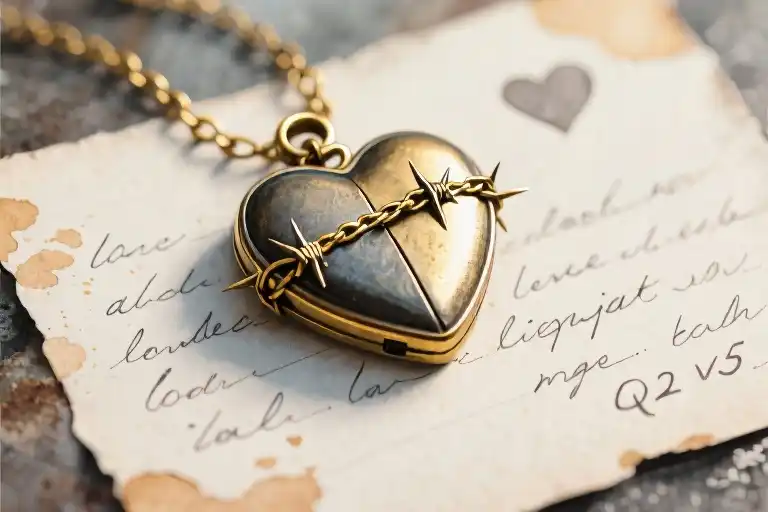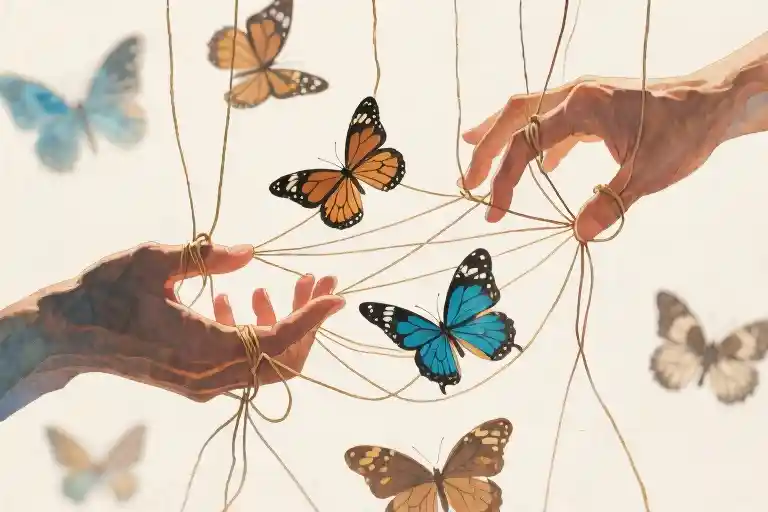It’s a peculiar feeling, really—that moment when you catch yourself apologizing for the way your heart flutters. Who in their right mind says sorry for falling in love? And yet, here I am, whispering ‘I’m sorry’ to an empty room every time my pulse quickens at the thought of someone.
Love is supposed to be light. It’s supposed to taste like honey and sound like laughter. But for some of us, it arrives wrapped in barbed wire. The more we reach for it, the deeper it cuts. We don’t feel guilty because we’ve done something wrong—we feel guilty because we’ve been conditioned to believe love is the prelude to pain.
I remember the first time it happened. The way my stomach dropped when I realized my feelings were growing faster than his. How I agonized over every text, convinced my affection was a burden. ‘Stop being so much,’ I’d scold myself, as if the volume of my heart was something to be ashamed of. This wasn’t about unrequited love—it was about unrequited permission to love at all.
What’s stranger still? The guilt often arrives before anything has actually gone wrong. It’s not a consequence; it’s a preemptive strike. Like hanging black curtains before the storm clouds even form. We apologize for disasters that never come, for wounds that never bleed, for crimes we never commit. All because somewhere along the way, we learned that love and loss travel hand-in-hand.
You might recognize this pattern if:
- Your first thought after catching feelings is ‘I shouldn’t feel this way’
- You downplay your affection to avoid ‘making things weird’
- You’ve ever sabotaged a potential relationship to spare someone the ‘inconvenience’ of your love
This isn’t about morality—it’s about muscle memory. When past experiences teach us that love leads to hurt, our psyche starts treating attraction like a fire alarm. The moment warmth appears, we’re already bracing for burns. But here’s what we forget: fire alarms can be reset. And sometimes, what smells like smoke is really just someone lighting candles.
So to anyone who’s ever apologized for their heartbeat: your love isn’t the problem. The problem is the story you’ve been told about what your love means. And stories—no matter how deeply etched—can always be rewritten.
When Love Turns to Guilt: The Paradox of Affection
It starts with a flutter in your chest—that unmistakable sign your heart has chosen someone new. But instead of joy, what follows feels suspiciously like shame. If you’ve ever mentally apologized for developing feelings, you’re not alone in this emotional contradiction.
The Unwelcome Companion to Love
Guilt in love manifests in subtle but recognizable patterns:
- Preemptive self-blame: Thinking “I shouldn’t feel this way” before the other person even knows your feelings exist
- Emotional overcompensation: Going out of your way to “make up” for your affection through excessive giving or people-pleasing
- The apology reflex: Literally saying “sorry” when your feelings get revealed, as if love required forgiveness
“Do you also mentally rehearse confessing your feelings with an apology attached? Like somehow your heartbeat needs permission?”
Why We Pathologize Healthy Emotions
This phenomenon often stems from:
- Unrequited love guilt: Believing your unilateral feelings somehow burden the other person
- Trauma echoes: Past experiences where love was met with punishment or abandonment
- Boundary confusion: Mistaking healthy attraction for emotional trespassing
What makes this particularly painful is the cognitive dissonance—we intellectually know love isn’t wrong, yet our gut insists we’ve committed some invisible offense. The mind creates elaborate justifications: “If I love too much, I’ll scare them away” or “They’ll feel trapped by my feelings.”
The Hidden Cost
This guilt doesn’t just dampen romance—it:
- ⚠️ Creates artificial distance in relationships
- ⚠️ Teaches us to distrust our own emotions
- ⚠️ Turns love into something requiring atonement rather than celebration
Yet here’s what your guilt gets wrong: Love becomes problematic only through actions, never through existence. The difference between healthy affection and unhealthy behavior lies in respect, not in the feeling itself.
“Next time guilt whispers that your love is dangerous, ask: Have I actually overstepped, or am I punishing myself for a normal human experience?”
The Aftermath of Love: Why We Fear Our Own Heartbeats
That quiet voice whispering “you shouldn’t feel this way” when your pulse quickens around someone—it didn’t appear overnight. Like ivy creeping up a garden wall, these guilt responses grew slowly through seasons of emotional weathering. What makes us flinch at tenderness when we’re wired to crave it?
The Burned Hand Teaches Best
Remember childhood’s first kitchen lesson? Touch something hot once, and forever after you’ll blow on soup before tasting. Emotional wounds operate similarly. When early experiences—a caregiver’s neglect, a first love’s betrayal, constant rejection—taught your nervous system that loving = hurting, your psyche developed protective reflexes.
“It’s not that love itself is dangerous,” explains Dr. Sarah Bennett, relationship therapist. “But when formative connections involved pain, the brain creates shortcuts labeling all vulnerability as risky.” This explains why you might:
- Apologize instinctively when developing feelings
- Sabotage potential relationships preemptively
- Mistake healthy intimacy for “owing” someone emotional labor
Rewiring the Alarm System
Neuroplasticity research confirms our brains can update these fear responses. Start by mapping your emotional reflexes:
- Identify triggers (e.g., butterflies in stomach → immediate guilt)
- Trace their origins (“Mom said love was selfish when I needed attention”)
- Create counter-evidence (List times love brought joy without consequences)
“The heart that’s been burned remembers the heat, not the light. But both existed in that flame.”
Your Turn: Spot the Pattern
Try this journal prompt: “The first time I remember feeling guilty for affection was…” Notice how early experiences still echo in your current reactions. Healing begins when we separate past wounds from present possibilities.
Next: Practical exercises to rebuild your “love safety” instincts in Rewriting Love’s Script.
Rewriting Love’s Script: From Guilt to Self-Permission
That moment when your heart flutters—it should feel light, shouldn’t it? Yet for many of us, love arrives with invisible baggage. The weight of guilt presses against your ribs with every accelerated heartbeat. But here’s the truth your anxiety won’t tell you: love was never meant to come with an apology.
The Three-Step Cognitive Reset
1. Document the Evidence (Without Judgment)
Keep a small notebook or phone memo titled Love & Guilt Field Notes. When guilt surfaces, briefly record:
- The trigger (“Saw my crush smiling at someone else”)
- Physical sensations (“Chest tightness, 7/10 intensity”)
- Automatic thought (“If I weren’t feeling this, I wouldn’t get hurt”)
This isn’t diary-writing—we’re collecting data like anthropologists studying emotional patterns. Over weeks, you’ll spot recurring themes (“80% of entries involve anticipating rejection”).
2. Cross-Examine Your Guilt
When familiar guilt arises, ask these questions like a compassionate lawyer:
- “Where’s the proof my feelings caused harm?”
- “Would I blame a friend for feeling this way?”
- “Am I confusing love with responsibility for others’ emotions?”
Most discover their “guilt” stems from preemptive self-protection rather than actual wrongdoing.
3. Rewrite the Narrative
Here’s where magic happens. Take a documented automatic thought and rephrase it with radical permission:
| Old Script | New Truth |
|---|---|
| “Loving them will end in pain” | “My capacity to love proves my resilience” |
| “I shouldn’t feel this way” | “My feelings are valid weather patterns—they’ll pass” |
| “They’ll think I’m pathetic” | “How others interpret my heart says more about them” |
Breaking the Pain-Love Association
Our brains wire together what repeatedly occurs together. If past loves burned you, neurologically speaking, your mind now associates love with fire. But neuroplasticity means we can forge new pathways:
- Somatic Anchoring: When warmth of affection arises, physically press two fingers to your wrist. With repetition, this becomes a “safety switch” that says: This feeling can exist without danger.
- Guilt-Free Fantasies: Spend 5 minutes/day imagining positive love scenarios without self-interruption. Visualize your crush laughing at your joke while mentally repeating: This joy harms no one.
The Permission Manifesto
Copy this onto a sticky note:
*”I hereby grant myself full rights to:
- Feel without forensic analysis
- Desire without justification
- Love without liability”*
Every morning, read it aloud like a constitutional amendment for your heart.
When Progress Feels Impossible
Some days, the old scripts win. That’s normal. Try this emergency reset:
- Name three physical things you see
- Hum a comforting song for 30 seconds
- Whisper: “This guilt is just old armor. I can set it down.”
Remember what poet Nayyirah Waheed wrote: “You do not have to be good. You do not have to walk on your knees for a hundred miles through the desert, repenting.” Your love—unrequited, complicated, or terrifying—is already enough.
“Love isn’t a crime scene, and your heart is not the suspect.”
Your Turn: Which automatic thought will you rewrite today? Share one old script you’re ready to edit in the comments.
Your Story Deserves to Be Heard
If you’ve ever felt guilty for loving someone, let me tell you something important: your experience matters. That quiet shame you carry, the way you apologize for your own heartbeat – these aren’t just your burdens to bear alone. Many of us walk through life with this same invisible weight, and there’s profound healing in sharing our stories.
Why Sharing Helps
When we voice our experiences with guilt in love, three magical things happen:
- The shame loses power – Speaking aloud transforms abstract guilt into tangible words you can examine
- You find your people – That “am I the only one?” anxiety dissolves when others say “me too”
- New perspectives emerge – Hearing others’ journeys often reveals solutions we couldn’t see alone
Your Invitation
I’ve created a safe space below where you can:
- Share your experience with unrequited love guilt
- Describe when you first noticed love feeling dangerous
- Post one small step you’ll take toward self-acceptance this week
No judgment. No “right answers.” Just real people understanding real struggles.
A Simple Starting Exercise
If sharing feels too vulnerable right now, try this private reflection:
- Complete the sentence: “I feel guilty when I love because __“
- Now rewrite it with compassion: “My heart is trying to protect me by __“
- Notice the difference in your body between these two statements
Free Resource
I’ve prepared a Love Without Guilt mini-guide with:
- Daily affirmations for emotional trauma and love
- A “guilt trigger” tracking worksheet
- Gentle reminders that your feelings are valid
Remember This
Every time you share your truth about self-sabotage in relationships, you make it easier for the next person to speak theirs. Your story might be the exact mirror someone needs to see their own worth.
So tell me, what does your heart need to say today? The comments are open, and my inbox is always ready.
When Love Feels Like a Crime: Breaking Free from Unnecessary Guilt
“Has your heart ever whispered ‘I’m sorry’ when it started to fall in love?” This quiet apology we make to ourselves—sometimes to others—when affection blooms is more common than you might think. You’re not ridiculous for feeling this way. You’re simply someone who’s learned to associate love with consequences it never asked to carry.
The Weight We Attach to Affection
Guilt in love often manifests in subtle ways:
- Editing texts multiple times before sending
- Overanalyzing every compliment you give
- Feeling responsible for the other person’s emotional state
- Apologizing for “bothering” them with your feelings
These behaviors don’t stem from the love itself, but from what we’ve come to expect love to bring. Like carrying an umbrella every day because you remember how badly it hurt when it last rained.
Why Our Minds Betray Our Hearts
Neurologically, our brains create shortcuts between experiences. If past love brought pain (through rejection, loss, or disappointment), your mind may have filed “love” and “pain” in the same mental drawer. This is your brain trying to protect you—however misguided its methods.
Three signs you’ve developed this association:
- You feel relief when crushes go unreciprocated
- Romantic attention makes you uncomfortable
- You sabotage potential relationships preemptively
Rewriting Your Love Story
Try this simple reframing exercise next time guilt surfaces:
- Name the feeling: “I’m feeling guilty about my attraction to _.”
- Trace its origin: “This reminds me of when _ happened.”
- Separate past from present: “That was then. This is now. Different person, different story.”
Keep a journal tracking:
- When guilt arises
- What triggered it
- How you responded
- Alternative interpretations
Your Love Deserves Space
Consider this permission slip:
“I allow myself to feel what I feel without judgment. My affection harms no one. My heart’s intentions are pure. I release the need to apologize for my capacity to love.”
Would you tell a friend their love was something to feel guilty about? Start treating yourself with that same compassion.
Let’s Continue the Conversation
What’s one way you’ve unfairly judged your own feelings? Share in the comments—your story might help someone else feel less alone in this struggle.
Note: While these strategies can help, persistent guilt or anxiety may benefit from professional support. Your feelings matter.





